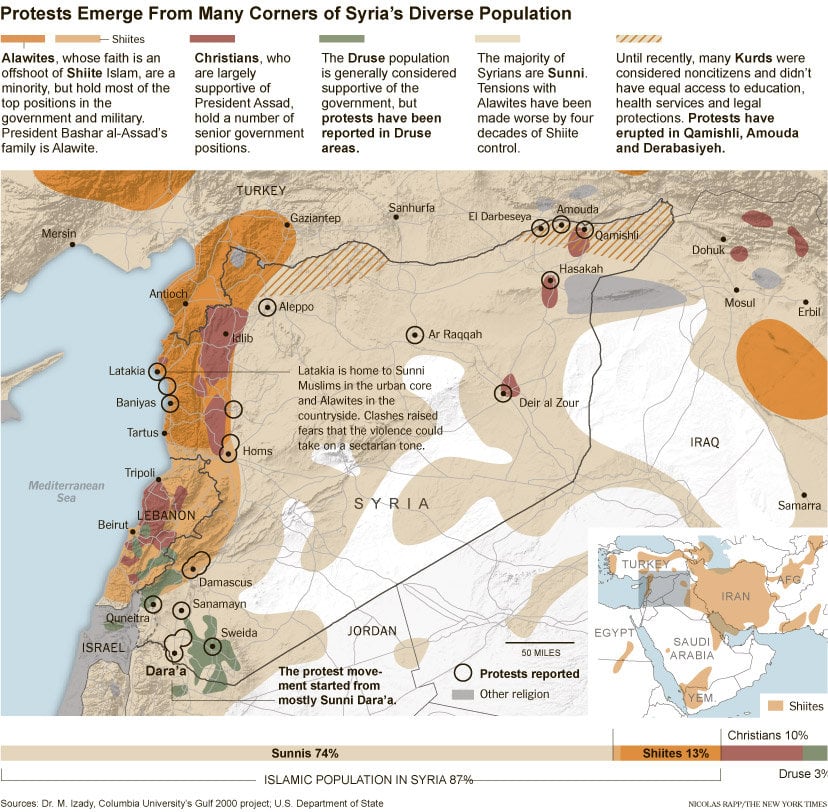The Opposition Position
The Syrian revolutionary movement now has officially formed a national council. And it's not as fragmented or weak as you think.
There's no use denying it: From the outside looking in, Syria's revolution sometimes appears to be little more than an unending cycle of violence, with no end in sight. Syrian dictator Bashar al-Assad has exploited this perception to apply all possible means to crush the revolt.
The conventional wisdom, however, is wrong. While the world has been preoccupied with crises such as the European financial collapse and the fall of Muammar al-Qaddafi's regime, the Syrian protest movement has grown by leaps and bounds, expanding its base of support and uniting its disparate groups. Much to Assad's chagrin, the more his security forces take action to suppress the opposition, the more the people's resolve to topple the regime increases. Far from the gloomy reports of impending civil war, Syria is heading toward a more peaceful and democratic future.
The evolution of this revolution from its early days has been dramatic. It began last March, with a few young boys scribbling anti-regime graffiti. During its early days, demonstrations were small, spontaneous, short-lived events that occurred in disconnected and confined areas of the country, like the towns and cities of Daraa, Jisr al-Shughour, and Hama. They were limited to Fridays, after prayers. Today, demonstrations are occurring daily and have swelled to include hundreds of communities throughout the country. Last week, for example, hundreds of demonstrations were reported in all regions, including Damascus, Aleppo, Homs, Hama, Latakia, Banias, Tartus, Sweida, and Hasakah.
Thanks to the young and technologically savvy grassroots movements that have sprouted all across Syria since March, demonstrations have become well-planned, coordinated, and carefully executed events -- including in Damascus and Aleppo, whose residents were first viewed as silent bystanders. While demonstrations were usually confined mostly to young men, today they include Syrians from all walks of life, with women and schoolchildren on the front line.
Demonstrations are lasting longer, and the youth movements have set up protocols to ensure that the injured are treated safely and those wanted by Assad's security services are protected and well hidden. And popular resistance is adopting new, innovative, cross-sectarian tactics to express dissent. On Sept. 24, for example, children in Idlib made a human formation of a cross and a crescent to show a united opposition.
While nobody a few months ago would have expected defections from the Syria army, the number of defected soldiers was recently estimated at 10,000 by a U.S. official, and the Free Syrian Army is swelling to include officers from all ranks. The Free Syrian Army has been providing an alternative to peaceful demonstrations for those living in areas under severe and brutal military campaigns, such as Homs, which has been subjected to horrendous crimes including rape, organ theft, skinning, and kidnapping of children.
Similarly, hundreds of members of the Baath Party, the government, and the unions have resigned in protest throughout Syria. The country has been hard hit by the economic losses caused by the demonstrations and the ensuing crackdown. Inflation has made everyday items some 30 percent more expensive, according to the latest increase in the consumer price index. The regime has reacted by suspending all new car imports to the country and is considering bartering its oil products in a desperate effort to cut costs and preserve Syria's foreign exchange reserves.
Six months ago, skeptics did not think that the opposition would be able to achieve the organization or common vision necessary to create a united opposition front. Today, the opposition is represented by the Syrian National Council (SNC), which has gained recognition from the demonstrators on the streets, Syrians abroad, and the international community. The formal establishment on Sunday, Oct. 2 of the council -- which seeks to topple the Assad regime and provide a credible, legitimate basis for a post-Assad transitional government that could peacefully usher in democratic change and build a modern civil state -- is a key milestone for the revolution.
We are well aware that a difficult road lies ahead. As the revolution matures, so have the tactics the regime is using to counter it. Security forces are resorting to tanks, bombs, and rockets to quell the demonstrations. They are destroying homes, businesses, livestock, and places of worship in the process. Entire communities are besieged, with cutoffs of their water, electricity, and phone lines. Rape and torture are routine, and there is evidence from credible sources that interrogators are exhausted from the sheer number of detainees.
Security forces are dressing up as civilians to confuse people and are using shrewd tactics to infiltrate the opposition. This month, the Syrian government set up an armed youth intelligence unit in which pro-regime youth volunteers receive training in special-forces camps before being dispatched to infiltrate the opposition and assassinate their leaders. According to U.N. sources, 3,545 people have so far been killed in this crackdown, including 217 children. And at least 20,000 have been detained, including intellectuals, writers, lawyers, and activists, some from Assad's own Alawite community, which is seen as the most supportive of his regime.
There is no doubt that the revolution is making progress toward toppling the regime. One only needs to dig a bit to see how the revolution's social base has widened, how the opposition has grown, and how the country has changed. Today, Syria is not on a road to nowhere. It is moving in the only direction it can go: onward and forward. There is no turning back.


